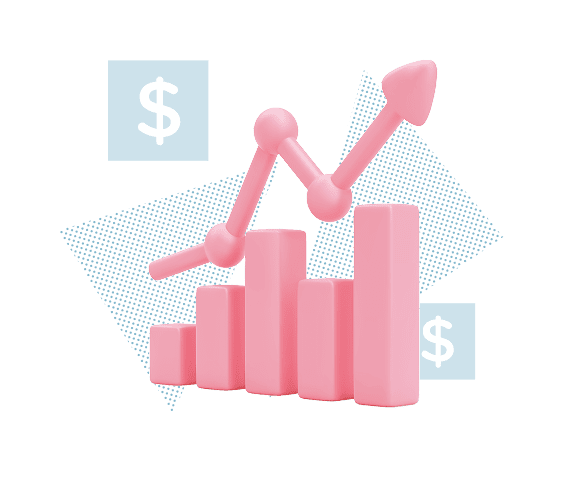What is the Average Stock Market Return in Singapore?
Updated: 9 Dec 2025
What is Singapore’s average stock market return?
The average stock market return reached 10% p.a. within 5 years as of March 2025, as recorded by the Straits Times Index (STI). However, it’s important to note that the average stock market returns often fluctuate widely, sometimes dramatically outperforming or underperforming that figure.
The STI is Singapore’s most widely recognised benchmark and a key indicator of the local stock market’s performance. Established in 1966, it monitors the performance of the top 30 largest and most actively traded companies listed on the Singapore Exchange (SGX). The STI provides investors with a broader range of investment options across different segments of the Singapore market.
>> Learn how to start investing in Singapore
Investing in the stock market works best when you're focused on the long term, ideally using funds you won’t need for at least five years. If you’re working with a shorter time horizon, it’s wiser to choose lower-risk alternatives, like a high-yield online savings account, where you’ll trade higher returns for greater financial stability.
>>Check out our roundup of the best SG stocks investment brokerage accounts.
Find the Best SGX Brokerage Accounts
Explore SG stocks investment brokerage accounts in Singapore and learn how to maximise your returns from SGX.
The average stock market return always differs
When it comes to the stock market, no two years are the same — and Singapore’s Straits Times Index (STI) is no exception. While the average stock market return within five years is 10% p.a., different numbers may be present in the year-on-year returns. In fact, 2020 to 2024 saw returns varying from -8.1% to 23.5%, with every year fluctuating.
>>Want to learn more? Check out how to build a stock portfolio
Key terms
| Key term | Definition |
| Return | The gain or loss generated by an investment relative to its purchase price. |
| Index | This refers to the collection of selected stocks used to represent the overall performance of a particular segment of the market. |
| Market Cycle | The recurring phases of the stock market are typically characterised by periods of growth (bull markets) followed by periods of decline (bear markets). |
| Portfolio | The complete set of financial assets held by an investor, which may include stocks, bonds, mutual funds, and other investments. |
3-year and 5-year STI returns p.a.
When evaluating stock market performance over time, annualised returns offer a clearer view of long-term investment outcomes. The STI has shown that the Singapore stock market can bring 11.6% annualised return over the past three years, boosted significantly by a strong rally in 2024. Despite more modest gains in 2022 (8.4%) and 2023 (4.8%), the standout performance in 2024 (23.5%) lifted the average, underscoring how a single strong year can meaningfully impact short-term investment results.
Looking at a broader time horizon, the STI posted a 10.0% annualised return over five years—consistent with historical expectations for long-term stock market growth. Even with market setbacks, disciplined investors who remained invested were rewarded with solid, compounding gains.
>>Want to know how to trade? Check out our newbie guide on investing in emerging market stocks.
| Period | Average STI return p.a. |
| 5 years |
10% |
| 3 years | 11.6% |
What you should expect from the average stock market return
While the stock market is inherently unpredictable, historical data provides a useful benchmark for setting expectations. So, what can investors anticipate moving forward?
The answer largely depends on the current phase of the market cycle. A widely accepted principle holds that periods of strong recent performance often lead to more moderate future returns, whereas market downturns may present opportunities for stronger gains ahead.
As a rule of thumb, many financial professionals recommend assuming an average annual return of approximately 6% when projecting long-term investment outcomes. However, it's important to recognise that the journey toward that average is rarely linear. It will include both strong growth years and periods of decline. For example, despite the upturn in 2024, the returns are falling steeply, with a 10.53% decrease at the start of 2025.
To navigate this variability, consider spreading investments across different sectors, asset classes, and geographical regions. This can reduce exposure to individual market fluctuations. Also, diversification helps mitigate risk, smooth out returns over time, and improve the resilience of an investment portfolio during periods of market volatility.
You can check out our guide on the best investment apps for beginners to learn more.
These are the key takeaways you should keep in mind so you can make money in the stock market:
-
Stay grounded during bull markets. It’s natural to feel confident when your investments are performing well. However, strong market rallies are often followed by more modest returns. It’s always important to remember that past gains don’t always guarantee future performance.
-
View downturns as opportunities. Market dips can be unsettling, but they often present valuable buying opportunities. When prices fall, you have the chance to purchase quality stocks at discounted valuations, potentially leading to greater returns when the market rebounds.
-
Consistency beats constant trading. Achieving average long-term returns requires a buy-and-hold approach. Frequent trading tends to reduce returns due to transaction costs, taxes, and poorly timed decisions. Research consistently shows that even professional fund managers struggle to outperform the market. While occasional portfolio rebalancing is wise—adjusting allocations to maintain your target mix—minimal intervention is typically best for compounding growth.
Over time, even a difference of just a few percentage points in returns can impact your financial future, potentially determining whether you retire comfortably or work longer than planned.
>>Learn more: How to build a stock portfolio
Want to get started on exploring the stock market?
If you're drawn to the long-term potential of the stock market, getting started is simpler than you might think. The first step is to open a brokerage account, which gives you access to buy and sell a wide range of market investments.
>>Not sure where to begin? Explore our top picks for the best online brokers.
Maximize Your SGX Investments: Compare Brokerage Accounts
Explore SG stocks investment brokerage accounts in Singapore and learn how to maximise your returns from SGX.








